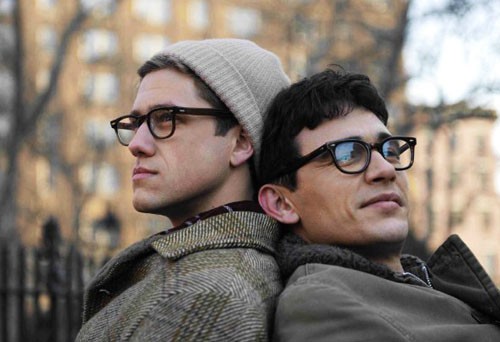The Allen Ginsberg biopic “”Howl”” is a strange beast. The film adaptation, written and directed by Rob Epstein and Jeffrey Friedman, is a story told in four parts — it cuts between an interview with Allen Ginsberg, played by James Franco; his reading of the poem for which the film is named, set to computer-generated imaging; scenes of the 1957 obscenity trial in San Francisco debating the publication of the poem by Lawrence Ferlinghetti; and black-and-white flashbacks from Ginsberg’s past that would eventually appear in the famous poem. However, this blunt, choppy style detracts from its greater mission.
“”Howl”” attempts to capture the spirit of the Beat Generation — the huddled collective of beatnik poets who came out the other side of World War II lost and displaced. The blend of four formats is disorienting, but does not add to the tension the plot is supposed to evoke. A bit unclear at first, the main narrative emerges as the obscenity trial in which the literary merit of Ginsberg’s poem is debated: is it unnecessarily obscene, or does it have validity? The film attempts to provoke questions of censorship and authenticity, the issues that surrounded Ginsberg’s experience, but the pace of the film is stunted and the progression halts rather than builds.
The animation in the film, too, detracts from the power of Ginsberg’s “”Howl.”” The poem is deeply disturbing, erotic, woeful and brilliant, yet the images in the film seem to marginalize the imagination and scope of the poem. Though the images are inspired by the book “”Illuminated Poems”” by Ginsberg himself, in the film they seem awkward and clunky — almost contrived.
James Franco’s portrayal of Allen Ginsberg redeems the film. In the interview portion, Franco is composed, mature and jaded; this presents a stark contrast to the Ginsberg portrayed in the flashbacks, where he is decidedly younger and more vulnerable. Franco builds a complex and layered character full of shy passion and speaks so honestly that it’s easy to fall under the spell of his poetic charm. Franco brings to life not only Ginsberg, but also the spirit of a generation in transition, wandering from the confines of conservatism to freedom of speech and choice. In his reading of Ginsberg’s poetry especially, Franco is the driving force of this film.
Though “”Howl”” is rough around the edges, Franco’s nuanced performance merits a trip to The Loft.









